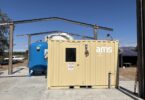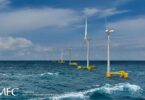The environment needs ways to successfully combat climate change. In this context, smart water solutions are becoming increasingly relevant.
Smart water involves digitally transforming the entire water cycle, providing technological solutions and improving resource management. However, above all, it is one of the keys to ensuring economic, social and environmental sustainability, and tackling climate change by reducing the water footprint.
There is increasing concern about climate change. In fact, the Eurobarometer Climate Change survey, published in April 2021, ranks climate change as the most important challenge facing the world, followed by poverty, hunger and water scarcity.
It is therefore essential to implement digital solutions that focus on sustainability and service strategies that tackle climate change by improving water and energy efficiency.
Water scarcity
The data provided by the abovementioned survey reveal another challenge that needs urgent attention: water scarcity. It is important to recall that approximately 2.5% of existing water reserves are freshwater, including groundwater. Effective water resource management is essential, with a population of 7.9 billion people and a highly industrialized world.
Technological solutions facilitate efficient water management by monitoring the six steps in the urban water cycle and optimizing operations at each stage, reducing water consumption and costs. This makes water technology an indispensable ally in the fight against climate change as we improve the management of this extremely scarce resource.
Smart water: areas of use
The boom in digital transformation has brought with it a number of technological solutions which can be customized to tackle different challenges.
However, this type of 4.0 management is not exclusive to any particular field. In fact, innovative smart water solutions promote operational efficiency in all areas.
This paper focuses on two areas:
- Agriculture
- Urban areas
The first point to consider in agriculture is that approximately 70% of freshwater is used for agricultural irrigation.
Therefore, given the forecast population growth and the social, strategic and economic importance of farming, it is crucial to increase control over water efficiency, consumption and possible leaks in the network. According to Begoña Tarrazona, Idrica’s Irrigation Specialist, “Agriculture is a strategic sector as it is essential to achieve sound land management and planning. This can be achieved by improving competitiveness and boosting efficiency in the use of resources and intermediate consumption“.
Likewise, Tarrazona believes that technology and research are fundamental in working towards sustainable agriculture, which is key to tackling climate change. In addition, the Idrica specialist mentions three technologies that will have a major impact in the coming years: smart irrigation, remote sensors and remote reading.
Digitally transforming agriculture is therefore a driver to meeting sustainability goals.
There are many advantages to implementing digital solutions for water management in the field of agriculture:
- a) Management optimization and enhanced efficiency
- b) Improved production
- c) Cost reduction
- d) Improvements in infrastructure
- e) Global knowledge
- f) Better customer, i.e., farmer, satisfaction
25% of the water used in cities is “lost”
Climate change is having a much greater impact on urban areas than expected. The gradual population increases and, above all, the rise in urban temperatures (3-4ºC higher than in rural areas, according to WWF) highlight the need to implement solutions to combat this situation.
Moreover, cities face another problem: a quarter of the water supplied to the network for domestic consumption is lost along the way. According to the latest data published by the Spanish National Statistics Institute (INE, 2018), the volume of non-registered water from leaks, fraud and meter failure represents 25% of the total amount of water supplied to the network.
It is therefore imperative to implement solutions for citizens that can reduce the water footprint and slow climate change. These solutions must be geared to data acquisition, processing and standardization, so as to harmonize indicators and obtain relevant information for decision-making.
The growing trend towards smart cities, marked by a quest for efficiency, sustainability and improved quality of life for citizens, is becoming increasingly relevant in urban areas. Smart water solutions have a special role to play in this context, consolidating urban areas as smart, sustainable cities. Valencia (Spain) is a good example of this, where Idrica, through Global Omnium, is driving the digital transformation of the city and the metropolitan area, thanks to the application of operational intelligence solutions for the water cycle, through the implementation of a Digital Twin, which combats climate change by simulating the system’s response to any request.
Irrespective of the approach, there is a need for a paradigm shift towards digital models, based on decisions that promote sustainability and tackle climate change. These decisions must be supported by data, technology, operations and a team of experts in the field.
Read more Idrica Articles and News on H2O Global News. Do you have an article or video that you would like to share? Submit your article here or keep up with the latest news from the water industry and wastewater industry by subscribing to our weekly newsletter







